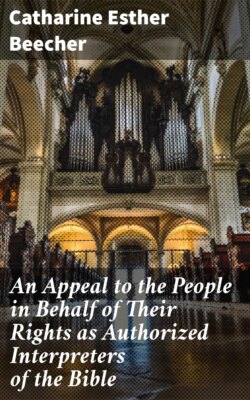Читать книгу An Appeal to the People in Behalf of Their Rights as Authorized Interpreters of the Bible - Catharine Esther Beecher - Страница 55
На сайте Литреса книга снята с продажи.
Reason, or Common Sense.
ОглавлениеTable of Contents
Of the thoughts which continually pass through the mind, we find that some are attended with a feeling of the real existence of the objects of our thoughts, and others are not so attended. For example, we may think of a man with a certain form carrying a dagger and going to commit murder, and with this, a feeling that no such thing is really existing. Again, we may have this same idea attended with the conviction that it is a reality.
This feeling of the reality of the objects of our thoughts is called belief, or faith.
Our minds are so made, that we necessarily believe not only that things are really existing at the present time, but that things will occur that are not now in existence. For example, we believe the sun will rise to-morrow morning in another place nearer toward the north or south than it did the present morning. We believe the tide will rise higher or lower on a coming day than it did the present day. And thus multitudes of events are believed to be in the future.
Those things which really do or will exist, in distinction from those we may think of but which do not and will not exist, are called truths, or realities.
All our comfort and happiness depend on our believing the truth, meaning by truth the reality of things. [pg 058] To believe that things exist when they do not, or that things are not existing when they are, involves certain pain, disappointment and mistake.
Our great safeguard from this is that part of our mental organization called reason, or common sense. This, as has been shown, consists in the necessary belief of certain truths by all men.
The test by which these truths are identified and distinguished from all other knowledge, is the fact that usually all men talk and act as if they believed them, and that when they fail to do so, they are regarded as having “lost their reason.”
The truths thus necessarily believed are the foundation of the process called reasoning, which is a mode of establishing other truths by the aid of those already believed.
These principles of reason or common sense are often called by other names, such as intuitions, intuitive truths, first principles, etc.
Thus all the powers of mind are arranged in the four general classes, viz., the intellect, the susceptibilities, the will, and reason or common sense.
In regard to the power of mind called reason, what is claimed here is, not that either the common people or metaphysicians have usually thus clearly set forth what is here so described and named; but that all men, learned and unlearned, allow that there are truths which are necessarily believed by all mankind; that these are the foundation of all reasoning, and that they often are called reason. So when any one is found to lack a belief in certain of these intuitive truths, he is said to have “lost his reason.” And when any act or assertion is seen to contradict any [pg 059] of these truths, it is said to be “contrary to reason.”
Therefore it is proper to put the belief in these implanted truths as a distinct power of the mind, and to call it “the reason.” And as the belief of these truths is common to all men, it is also proper to call it common sense.
